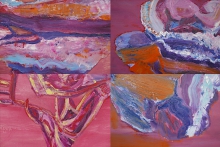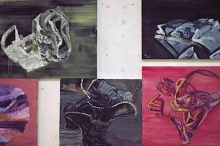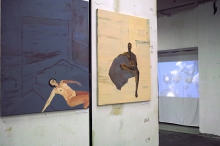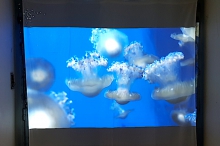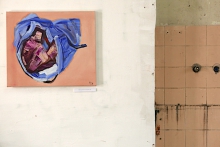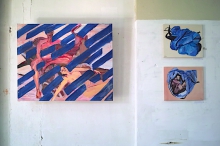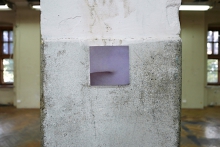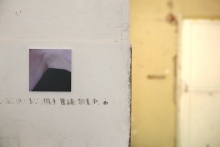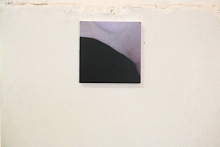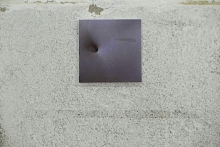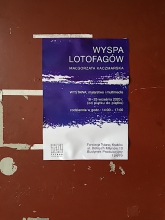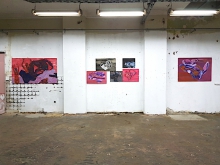18.092020
THE ISLAND OF LOTUS EATERS
Kaczmarska.pl | SHOWS > THE ISLAND OF LOTUS EATERS
What I wished to express with the set of paintings here presented is defined in the title of the exhibition, borrowed from literature – specifically, from Homer’s “Odyssey”. During his journey, Odysseus finds himself on the island of eternal happiness. What he describes of the island and its surroundings is reminiscent of an idyllic Mediterranean landscape, whereas the people who live there forget all their worries as a result of their lotus-flower diet. Odysseus warns prospective travellers about the island, and heeds them not to eat the lotus, lest they forget about the whole world, immerse themselves in the atmosphere of the island, and never return home. I compared the eternal bliss of the Island of Lotus Eaters to the state of love or fascination with another person. A state when the outside world ceases to exist, and we live – very intensely and with all our senses – through the other person. Before we find ourselves in the space of the island, everything seems to be just fine (“Without Her”) but only being on the island makes us truly happy, and life fills with colours (“The Island”).
Since I have repeatedly painted nudes in the past, this time I set myself the task of conveying, through art, the intensity of a relationship between two people. I did this through a metaphor. This is how a set of paintings and videos of “jellyfish” was created. In its shape and its movement, jellyfish evokes erotic connotations. I painted specific objects (elements of female underwear) as if they were living creatures. I tried to expressively convey the specific juiciness of the objects-creatures. These objects-creatures float in an undefined, coarsely painted space. Just as jellyfish can sting, this deep immersion in eroticism can have unforeseen consequences – there is a danger of drowning (“Great Wave”). I also showed the human body in a particular way, by photographing it up close and framing it so that the images became abstract. It is difficult to recognize whether this is a female or a male body in the photograph, and what fragment of that body was captured, and yet corporeality is there, clearly felt.
The state of “eternal bliss” lasts as long as we eat lotus flowers, but there comes a moment when it all ends. The more immersed we were in the island’s atmosphere, the more painfully we miss it. We may still try to hang on to it, to continue in the situation (“Her Object”, “His Object”) but we know that the initial euphoria is gone. “Romanticism is over” as a historical era, a style in art history, and as a certain stage in a relationship with another person. It can evolve into other – more or less attractive – forms, or it can mark the end of an island adventure.
The artistic and ideological summary of this scenario is the painting titled “Our Thoughts”. Instead of dwelling on the elements of loss and despairing or getting angry, perhaps it is better to appreciate that we were given a chance to experience something wonderful; something not everyone is lucky enough to have. It is worth remembering wonderful moments and people with whom we experienced those moments – why not enjoy this wealth and let go of the bitterness of loss and pain.
Situated among the waves of the sea,
on the shore made of yellow sand
a gentle breeze, like sighs.
It seems like an eternal afternoon:
The people of the island feed on lotus flowers
that make them forget all their worldly cares.
If an imprudent traveller tastes the lotus,
he will lose the will to return to his homeland,
and fall into a waking sleep forevermore.
[Based on Homer’s “Odyssey” and “The Dictionary of Imaginary Places” by Alberto Manguel and Gianni Guadalupi]

